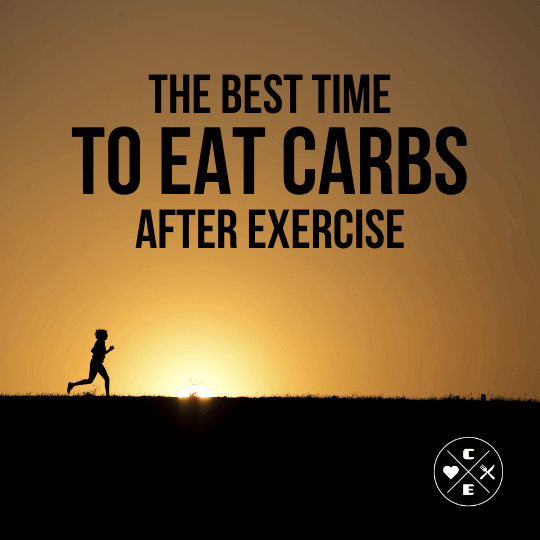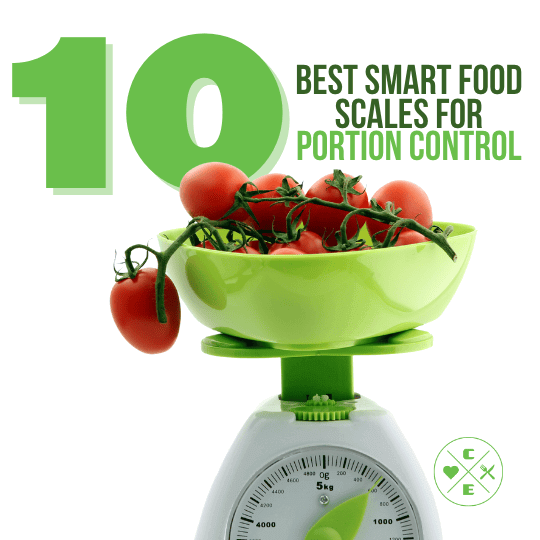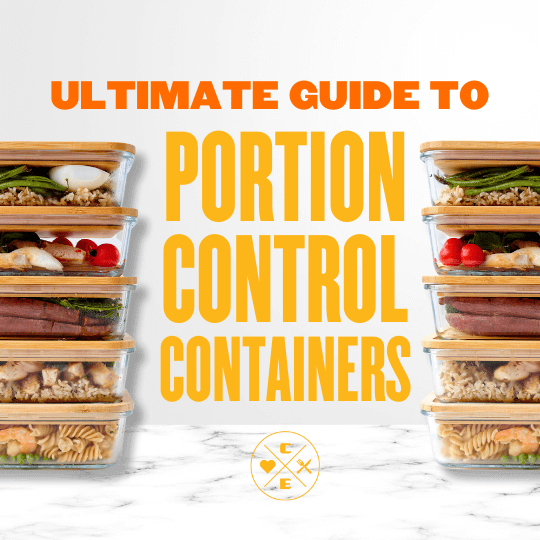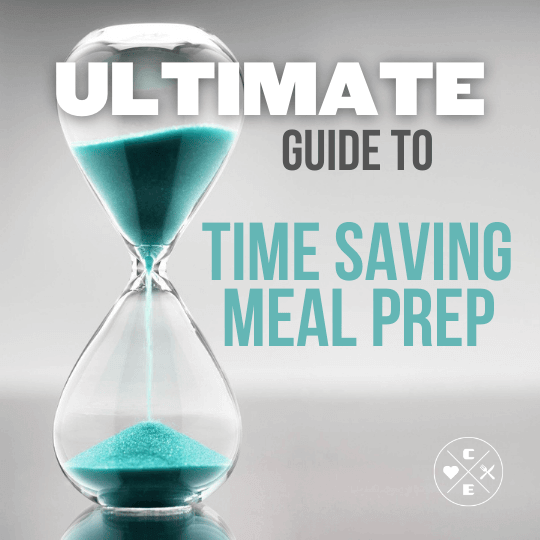
Best Time to Eat Carbs After Exercise
Jason Nista
Nutrition
|
Exercises & Fitness
7 minute read
Table of Contents
The best time to eat carbs after exercise is within the first 30 minutes. This is when your muscles are most effective at absorbing nutrients, helping to restore glycogen, ease soreness, and support muscle repair. Here's a quick guide:
- First 30 Minutes ("Metabolic Window"): Consume 0.5-0.7g of carbs per pound of body weight (e.g., 75-105g for a 150-pound person). Fast-digesting carbs like bananas or sports drinks work best.
- Next 4 Hours: Continue eating carbs (0.4g per pound of body weight) with protein for sustained recovery. Include slow-digesting carbs like oats or sweet potatoes.
- Carb-to-Protein Ratios: Use a 3:1 ratio for strength training or 4:1 for endurance activities to maximize recovery.
- Hydration: Replace fluids lost during exercise with water and electrolytes.
Eating the right amount and type of carbs at the right time can significantly improve recovery and prepare your body for the next workout.
What To Eat Before, During & After Training For Max Muscle Growth
When to Eat Carbs After Exercise
Timing your carbohydrate intake after exercise can play a big role in how well your body recovers and prepares for the next workout.
First 30 Minutes Post-Workout
The first 30 minutes after exercise, often referred to as the "metabolic window", is when your muscles absorb nutrients most effectively.
If your workout lasted longer than 90 minutes, focus on getting carbs right away. The recommended amount is 0.5-0.7 grams per pound of body weight (1.1-1.5 grams per kilogram). For example, a 150-pound athlete would need about 75-105 grams of carbs.
| Exercise Type | Carbs (First 30 mins) |
|---|---|
| High-intensity (>90 mins) | 1.0-1.5 g/kg |
| Moderate-intensity (60-90 mins) | 0.5-1.0 g/kg |
| Low-intensity (<60 mins) | Regular meal timing acceptable |
After this initial window, the focus shifts to maintaining steady carbohydrate intake to fully restore glycogen levels.
30 Minutes to 4 Hours After Exercise
The International Society of Sports Nutrition suggests consuming 0.4 grams of carbs per pound of body weight (0.8 grams per kilogram) within the first four hours after a workout.
To maximize recovery during this period:
- Include a carb-and-protein meal within 90 minutes.
- Add a snack around the two-hour mark if you have another workout within 24 hours.
- Continue eating carb-rich meals for the next 2-4 hours.
"In a 2017 study published in the Journal of Applied Physiology, researchers at the University of Bath found that cyclists who consumed carbohydrates immediately after a 2-hour cycling session had 20% higher muscle glycogen levels after 4 hours compared to those who delayed carb intake by 2 hours."
For athletes with multiple training sessions in a day, consistent carbohydrate intake during this time is crucial. Choosing the right types of carbs can help you make the most of this recovery period.
Best Types and Amounts of Carbs
The type and amount of carbohydrates you consume play a key role in how effectively your body recovers. To make the most of timing strategies, focus on these carb types and amounts:
Fast vs. Slow-Digesting Carbs
Fast-digesting carbs are essential right after a workout, especially during the first 30 minutes. On the other hand, slow-digesting carbs help maintain recovery over the next few hours. Here's how to approach it:
- Fast carbs (first 30 minutes): White rice, bananas, sports drinks
- Slow carbs (next 4 hours): Oats, whole grains, sweet potatoes
For the best results, start with fast-digesting carbs immediately after exercise, then switch to slower-digesting options in your next meals.
Carb Serving Guidelines
The following guidelines are based on body weight to ensure effective recovery over an extended period (2-4 hours):
| Body Weight | Carb Intake per Hour |
|---|---|
| 130 lbs | 52g |
| 150 lbs | 60g |
| 180 lbs | 72g |
Endurance athletes typically need more carbs (around 1.5g per kilogram of body weight) compared to strength-focused individuals (1.0g per kilogram). Pairing 60g of carbs with 15-20g of protein can further support glycogen replenishment and muscle repair. Protein combinations will be discussed in the next section.
sbb-itb-1989a25
Mixing Carbs, Protein, and Fluids
Adding Protein for Better Results
Pairing carbohydrates with protein after a workout helps speed up recovery by improving glycogen storage and promoting muscle repair. Research indicates that this combo can boost glycogen replenishment rates by as much as 40% compared to consuming carbs alone [1][2].
To get the best results, stick to a 3:1 ratio for strength training or a 4:1 ratio for endurance activities. The International Society of Sports Nutrition (ISSN) recommends consuming 0.8g of carbs and 0.2-0.4g of protein per kilogram of body weight within four hours after exercise [3]. This balance makes it easier to plan practical post-exercise meals, which we’ll dive into soon.
Water and Electrolyte Needs
Staying hydrated is key to speeding up glycogen recovery. Replace lost fluids by drinking 16-24 oz of fluid for every pound of body weight lost during exercise, aiming to replenish 150% of the total loss within 2-4 hours [4][5]. For effective hydration:
- Add electrolytes: Opt for drinks that provide sodium and potassium.
- Check hydration levels: Pale yellow urine is a good indicator of proper hydration.
Simple options like chocolate milk (which offers a 3:1 carb-to-protein ratio) or electrolyte-enhanced drinks can cover both hydration and recovery needs.
Quick Post-Workout Meal Options
To make the most of your post-workout nutrition, try these easy and effective meal ideas:
Quick Recovery Meals
Look for meals that combine fast-acting and longer-lasting energy sources:
Easy-to-Assemble Options:
- Chocolate milk paired with a banana for a mix of fast-digesting carbs and protein.
- A turkey sandwich on whole-grain bread for a balance of quick and sustained energy.
Prep-Ahead Choices: Overnight oats with protein powder or Greek yogurt parfaits are perfect for a grab-and-go option.
Smoothie Fix: Blend a banana, protein powder, and oats for a quick, drinkable recovery meal when you're not in the mood for solid food.
These options are designed for quick consumption, helping you refuel efficiently during the crucial post-workout window.
Clean Eatz Kitchen: A Convenient Solution
If you prefer ready-made meals that don't sacrifice nutrition, Clean Eatz Kitchen offers portion-controlled, high-protein meals tailored for recovery. These meals are designed to support glycogen replenishment and muscle repair.
Why Choose Clean Eatz Kitchen?
- Balanced carb and protein ratios to meet recovery goals.
- Ready in just three minutes using a microwave.
- High-protein meals with a mix of fast and slow-digesting carbs.
Conclusion: Post-Exercise Carb Guidelines
Timing and Food Choice Summary
Using the right timing and food combinations can make a big difference in how well you recover between workouts. Studies consistently highlight that the timing of post-exercise carbs plays a key role in recovery. To get the best results, pair fast-digesting carbs, like glucose, with slow-digesting options, such as whole grains.
Here’s a quick recap of how these carbs work together for recovery:
- Fast-digesting carbs: Foods containing glucose or maltodextrin deliver quick energy to refuel your muscles.
- Slow-digesting carbs: Whole grains and vegetables provide sustained energy to keep recovery going.
Tips for Time-Saving Meal Prep
Planning ahead can help you stay on top of your post-workout nutrition. Here are a few practical ideas to make it easier:
- Pre-portioned meals: Prepare meals in advance with balanced amounts of carbs and protein to grab and go.
- Portable snacks: Keep convenient options on hand, like ready-to-drink protein shakes with added carbs or trail mix made with dried fruits and nuts.
For those with busy schedules, meal prep services like Clean Eatz Kitchen offer a simple solution. Their pre-made meals are designed with precise portions and balanced nutrients, making it easy to stay consistent with your recovery nutrition.
FAQs
What is the best carb to eat after a workout?
After a workout, go for fast-digesting carbs like bananas or white rice to help kick-start recovery. Later meals can include slower-digesting carbs like oats to maintain energy levels.
The right choice depends on factors like:
- Fast-digesting carbs: Ideal for quick recovery after exercise.
- Slow-digesting carbs: Better for steady energy throughout the day.
- Workout intensity and duration: Adjust portions based on how hard and long you trained.
For convenient options, check out our recommended recovery meals or meal prep ideas. Stick with foods that are easy to digest and fit seamlessly into your routine.
Related Articles
10 Best Smart Food Scales for Portion Control
8 minute read
Ultimate Guide to Portion Control Containers
8 minute read
Ultimate Guide to Time-Saving Meal Prep
9 minute read



